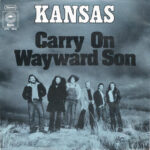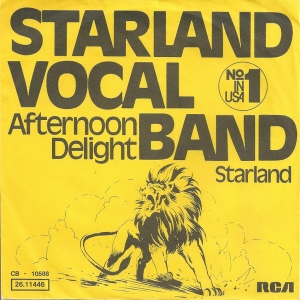 When Kansas released “Carry On Wayward Son” in 1976, they were not merely putting out a single—they were crafting an anthem of resilience, introspection, and musical grandeur that would endure for decades. Opening with a sweeping acoustic guitar intro that leads into a flurry of intricate riffs and layered harmonies, the song immediately commands attention, drawing listeners into a story that is as personal as it is universal. Written by guitarist Kerry Livgren, “Carry On Wayward Son” resonates with themes of struggle, perseverance, and self-discovery, capturing the emotional complexity of the human experience. Its blend of progressive rock sophistication, compelling storytelling, and sing-along choruses made it an instant classic, cementing Kansas’ place among the iconic rock bands of the 1970s. Even today, it stands as a testament to the enduring appeal of arena rock infused with intellectual and emotional depth.
When Kansas released “Carry On Wayward Son” in 1976, they were not merely putting out a single—they were crafting an anthem of resilience, introspection, and musical grandeur that would endure for decades. Opening with a sweeping acoustic guitar intro that leads into a flurry of intricate riffs and layered harmonies, the song immediately commands attention, drawing listeners into a story that is as personal as it is universal. Written by guitarist Kerry Livgren, “Carry On Wayward Son” resonates with themes of struggle, perseverance, and self-discovery, capturing the emotional complexity of the human experience. Its blend of progressive rock sophistication, compelling storytelling, and sing-along choruses made it an instant classic, cementing Kansas’ place among the iconic rock bands of the 1970s. Even today, it stands as a testament to the enduring appeal of arena rock infused with intellectual and emotional depth.
The song’s universal message is part of its genius. With lyrics addressing the struggles of life, the search for purpose, and the hope for guidance, “Carry On Wayward Son” speaks to anyone navigating uncertainty or adversity. Its chorus—“Carry on, my wayward son / There’ll be peace when you are done”—serves as both a warning and a reassurance, a call to perseverance that resonates across generations. Kansas’ ability to marry these profound themes with compelling musical arrangements transformed the song into a timeless anthem, capable of inspiring listeners whether in moments of personal reflection or collective celebration at stadium concerts.
The Songwriting and Inspiration
Kerry Livgren, the band’s primary songwriter, composed “Carry On Wayward Son” as a deeply reflective piece. Drawing inspiration from his own spiritual and philosophical explorations, Livgren crafted lyrics that delve into self-discovery, moral struggle, and the human journey. The song’s introspective nature sets it apart from more superficial rock hits of the era, offering depth and contemplation alongside technical musical brilliance.
The composition reflects the hallmarks of progressive rock, with multiple time signatures, shifts in tempo, and intricate instrumental passages. Yet it also maintains accessibility, with a memorable chorus and melodic structure that engages even casual listeners. This duality—complexity paired with singability—ensured that “Carry On Wayward Son” would resonate widely, appealing to both serious music enthusiasts and mainstream audiences.
Musical Composition and Arrangement
The song begins with a deceptively simple acoustic guitar riff, soon joined by layered harmonies and a driving rhythm section. The arrangement gradually builds, introducing electric guitars, keyboards, and vocal harmonies that create a rich, multi-dimensional soundscape. Kansas’ use of dynamic contrast—alternating between reflective verses and powerful choruses—enhances the narrative tension, mirroring the thematic journey from doubt and struggle to resolution and hope.
Steve Walsh’s vocals are central to the song’s impact. His ability to convey both vulnerability and conviction gives the lyrics emotional weight, while his soaring delivery on the chorus transforms the refrain into an anthem. The instrumental sections, particularly the virtuosic guitar and keyboard solos, further elevate the song, demonstrating Kansas’ musicianship and their commitment to creating art that is both technically impressive and emotionally compelling.
1976: A Year of Progressive Rock
“Carry On Wayward Son” emerged at a time when progressive rock was flourishing, with bands like Yes, Genesis, and Emerson, Lake & Palmer pushing the boundaries of rock music. Kansas distinguished themselves within this landscape by blending technical proficiency with American heartland sensibilities, creating a sound that was both grandiose and grounded.
The song’s success helped define the era’s arena rock aesthetic, demonstrating that complex compositions could achieve commercial success without sacrificing artistic integrity. It bridged the gap between the cerebral aspects of progressive rock and the communal appeal of mainstream rock, making it a fixture on radio and in concert halls alike.
Lyrics and Emotional Resonance
The lyrics of “Carry On Wayward Son” are poetic yet direct, balancing spiritual reflection with narrative clarity. The song explores the tension between doubt and determination, encapsulated in the recurring call to “carry on.” This refrain resonates as both a personal mantra and a universal message, speaking to anyone facing challenges or seeking meaning in life.
Lines like “Masquerading as a man with a reason” and “Though my eyes could see I still was a blind man” reflect the human struggle for understanding and the complexities of personal growth. These words, paired with the soaring musical arrangement, create a cathartic experience, allowing listeners to connect emotionally while appreciating the song’s musical sophistication.
Reception and Impact
Upon its release, “Carry On Wayward Son” quickly became Kansas’ breakthrough hit. It reached the Top 10 on the Billboard Hot 100 and received extensive radio play, securing the band’s place in the pantheon of 1970s rock. Critics praised the song for its ambitious composition, compelling vocals, and lyrical depth, noting that it successfully balanced progressive rock complexity with mass appeal.
The track’s impact extended beyond commercial success. It became a defining anthem for Kansas, shaping their live performances and establishing a template for subsequent hits. Its enduring popularity is evident in its continued presence on classic rock radio, its frequent inclusion in film and television soundtracks, and its status as a staple of karaoke and air-guitar culture.
Live Performances and Legacy
Kansas’ live performances of “Carry On Wayward Son” further enhanced the song’s reputation. The band’s ability to replicate the studio intricacies on stage, combined with extended instrumental solos and audience participation, transformed each performance into a shared, almost ritualistic experience. The song’s energy and narrative arc make it a highlight of concerts, consistently eliciting enthusiastic response from fans.
Over the years, “Carry On Wayward Son” has influenced countless musicians across genres. Its blend of narrative lyricism, complex musical structure, and singable hooks has inspired rock, metal, and progressive artists alike. The song demonstrates that technical proficiency need not alienate listeners; instead, when paired with relatable themes and compelling melodies, it can elevate a song to timeless status.
Cultural Resonance
The song’s cultural impact extends beyond the music industry. Its themes of perseverance and self-discovery resonate in broader cultural contexts, appearing in films, television series, and motivational media. Most notably, “Carry On Wayward Son” has become synonymous with triumph over adversity, frequently used to underscore moments of victory, introspection, or transformation in storytelling. Its enduring presence in popular culture underscores its universality and emotional power.
Kansas’ ability to fuse narrative, emotion, and musicianship has ensured that “Carry On Wayward Son” remains a reference point for both fans and musicians. The song is often cited as one of the quintessential examples of American progressive rock, combining intellectual depth, technical prowess, and emotional accessibility in a single, unforgettable package.
Why the Song Endures
Decades after its release, “Carry On Wayward Son” continues to resonate because of its combination of musical brilliance, lyrical depth, and universal themes. It speaks to the human experience of struggle and resilience, offering reassurance that challenges can be overcome and that growth is possible. The song’s intricate arrangements, memorable hooks, and soaring vocal lines ensure it remains engaging, while its message of hope and perseverance gives it lasting emotional weight.
Its continued relevance is also reinforced by the song’s adaptability. Whether performed by Kansas in concert, covered by other artists, or used in media, “Carry On Wayward Son” retains its power and appeal. Its layered composition allows for reinterpretation, while its core message remains as compelling as ever.
Conclusion: A Timeless Rock Anthem
Released in 1976, Kansas’ “Carry On Wayward Son” is more than a classic rock hit—it is a musical journey through struggle, perseverance, and self-discovery. Its sophisticated composition, memorable lyrics, and compelling vocal performance create an experience that is both intellectually engaging and emotionally resonant. The song captures the essence of progressive rock while remaining accessible, offering listeners both a technical marvel and a deeply human story.
“Carry On Wayward Son” endures as a testament to Kansas’ artistry, the power of rock music to convey universal truths, and the timeless appeal of songs that speak to resilience and hope. Its legacy is felt not only in the hearts of listeners but across generations of musicians inspired by its ambition, narrative depth, and emotional impact. It remains a definitive anthem, reminding us that, no matter the challenges we face, we must carry on—and in doing so, we discover strength, purpose, and ultimately, peace.


